Ken Russell is leaning on his stick outside the Pebble Beach restaurant in Barton-on-Sea, Hampshire, while his fourth wife parks the car. "Thanks for recognising me," he says as I shake his hand. It would be hard not to. Russell is wearing open-toed sandals, red trousers pulled up so far over his waist they're bearing down on his nipples and stripy shirt, while his big florid face is topped by a rage of grey hair.
But today Russell, now 84, has the air of a last-act Lear, or Tigger unbounced. Two weeks ago he suffered a stroke; this is only his second outing from the New Forest hospital where he's been recuperating. After greeting me, he looks rheumily out into the middle distance, forestalling conversation. Lisi Tribble, that fourth wife, helps him shuffle to our table. Diners furtively view our procession. Tribble carries a star-spangled wizard's robe that Russell recently wore in a film about Aleister Crowley, the occultist nicknamed the Great Beast. She's a determinedly upbeat and chatty foil to the wounded beast. The photographer and I trail in their wake like minor officiants.
We're meeting because Russell's notorious film The Devils will be shown in a rare uncut screening on Sunday at the East End film festival. Filmgoers will be able to savour its so-called "rape of Christ" sequence in which 17th-century French Ursuline nuns defiled a statue of Jesus during an orgy – not to mention the scene in which Sister Jeanne (Vanessa Redgrave) masturbates with a charred bone from a burned priest played by Oliver Reed. Plenty of other sequences kept censors the world over in business. The Devils had the singular fate of winning a silver ribbon for best foreign film from the Italian National Syndicate of Film Journalists in 1972, while being banned throughout Italy.
After Russell orders a bottle of Sauvignon Blanc, I ask what he remembers about making The Devils 40 years ago. "Nothing," he replies. "I have short-term memory loss." "You don't have long-term memory loss," says Tribble sensibly. Surely, I suggest, you must remember that after the Evening Standard's Alexander Walker called The Devils "monstrously indecent", you hit him with a rolled-up copy of his newspaper? "I wish it had been an iron bar," he says.
"He usually thinks horrible thoughts about his critics," Tribble says.
"I thought him to death," Russell replies.
Certainly Russell seems to outlive his foes. "Yeah – don't cross Ken," Tribble says. Russell jerks his chin in approval.
You directed another film the same year, I prompted him. The Boy Friend, starring Twiggy, a musical comedy that was cleansing sorbet to The Devils' main course of lust and gore. "Did I?" And this was the year after your adaptation of DH Lawrence's Women in Love triumphed at the Oscars. (Glenda Jackson won best actress award, and cinemagoers were transfixed by Oliver Reed and Alan Bates wrestling in the nude.) Was Women in Love your signature film? Russell waves away the question and orders fish and chips.
Perhaps more Devils-related questions will get more in the way of response. Russell's film was adapted from Aldous Huxley's 1952 non-fiction novel The Devils of Loudon, as well as John Whiting's follow-up 1960 play The Devils. They were all inspired by the notorious case of supposed demonic possession in 17th-century France, in which a charismatic Catholic priest, Urbain Grandier, was accused of bewitching nuns. The accusation was trumped up by Richelieu as an excuse to destroy a Protestant stronghold.
Russell takes even more liberties with this material than Huxley. Why portray the king as a cross-dressing homosexual who shoots Protestants dressed as birds in his royal park for fun? "Because that's exactly as I saw him," says Russell.
In among The Devils' manifold Pythonesque moments, Oliver Reed is the standout as Grandier, turning in a performance both erotically charged and nobly restrained. Do you think Reed's restraint juxtaposes powerfully with other performances in the film? "He was very restrained, yes. He was such a presence," Russell says. "He was the most beautiful man on the Earth," says Tribble. "And in lots of films he was your alter ego," she tells her husband. "He had quite the barrel chest." Russell, gamely, puffs up his own by way of reply.
Russell mentions he was inspired by one particular line in Huxley's book. "The exorcism of sister Jeanne," wrote Huxley, "was equivalent to rape in a public lavatory." Hence the film's vision of Loudon as a pristine, white-stone city and the convent as clad in white tiles (Derek Jarman designed the sets). Russell recalls the film's final shot: "The girl goes up the hill of broken bricks." The girl (Grandier's recently widowed wife) walks over Loudun's ruins into a landscape in which the only objects are posts topped by carriage wheels, on which Protestant corpses turn in the wind. "Polanski is said to have been inspired by that shot for the last scene of The Pianist," Tribble says.
Russell then suggests The Devils is a religious film that takes inspiration from his own Catholic faith. "It's about the degradation of religious principles," he says. "And about a sinner who becomes a saint."
Appropriately, for a sinner who became a saint, Russell had to cut his own film to ensure it got even an X certificate. Out went the "rape of Christ". The pubic hair had to go for the US censor. Surely there was on-screen pubic hair when Reed and Bates went mano a mano in Women in Love? How could it be a problem in The Devils? "That was men's pubic hair, not women's," says Tribble.
Tribble and Russell met in Charlotte, North Carolina, in the early 70s. He came to town for a screening of his 1972 film Savage Messiah, and she was working at the box office. She already loved his work. Why? "The way he expresses the truth of emotional pain with such energy." Russell asked her to appear in his 1975 film Lisztomania, but her mum wouldn't let her. A quarter of a century and three wives later, he married her.
"He's always needed beautiful women," she says. "Haven't you, dear?" Russell nods and then winks at me. The old devil. "If you look at his films, there is regularly an afflicted man saved by a woman."
Where did this come from? "Southampton," Russell says, curtly. He's referring to his upbringing in the city of departures and arrivals, one to which he says he never really belonged. "What did you say when your mother found you dancing naked to Stravinsky in the living room?" prompts Tribble. "Like a nice cup of tea, Ken?" retorts Russell with what his mum said to him. But she wasn't the problem. "Your dad was brutal and undermining," says Tribble. "What was it he said when you told him you wanted to be a dancer?" Russell: "I don't know what they'll think about that in St Mary's."
Russell says he spent much of his youth in the cinema with his mum, eluding his dad – but with a typical little-boy's disdain for her choice of romantic movies. "I used to say to her when we got to the cinema: 'It's not going to be love?' 'No, Ken.' But it always was," he says ruefully. "She'd say: 'So listen to the organ.'" Occasionally, he went on his own. "A man felt my leg during Pinocchio," he recalls. "I saw Secret of the Loch [the 1934 Nessie flick] on my own. They seemed to use a plucked chicken for the monster. Never in my life have I been so frightened. I ran out of the cinema."
As a teenager, he joined the merchant navy, ostensibly to find Dorothy Lamour (from the Crosby-Hope Road movies). "When he realised she wasn't in the South Seas, he had a breakdown," says Tribble. This sounds like a cock and bull story, but Russell adds: "I did have a breakdown. Listening to Tchaikovsky cured me." Which Tchaikovsky? "B flat minor. Solomon." He means the Piano Concerto No 1.
Russell is exhausted and can only just be persuaded to pose for photos. We stand on the terrace, with its view of yachts on a silver sea and the Isle of Wight behind. This is Hampshire on Easter Saturday, but it looks like festival-time Cannes. Tribble drapes her husband in the Aleister Crowley robe. Russell leans on his cane, like a theosophical Fred Astaire.
We say our farewells. I tell Russell I hope he's well enough to attend the screening of The Devils. "I don't know what he's talking about," he says to Tribble. She goes off to get the car to drive him back to hospital. Did he really not understand or was he just being cantankerous? Let's hope the latter. Better Ken Russell the old devil than anything less.
The Devils screens at the Barbican, London on Sunday. Details: eastendfilmfestival.com
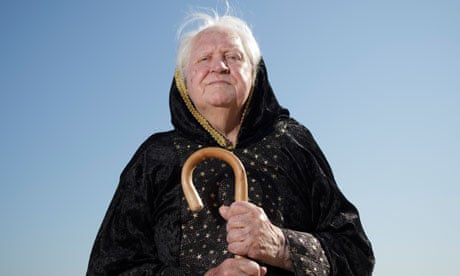
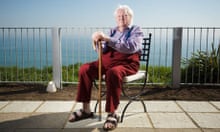
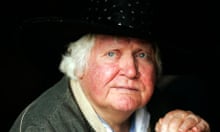
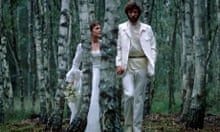
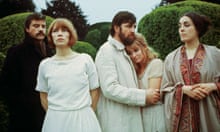
Comments (…)
Sign in or create your Guardian account to join the discussion